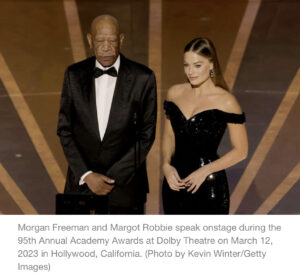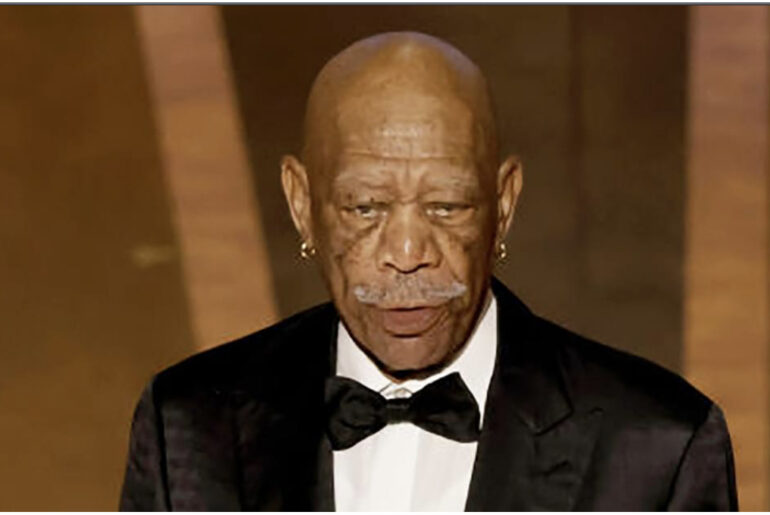Despite excruciating pains after a near-fatal car crash, Oscar-winning actor Morgan Freeman shows his strength of character is equally indelible to his distinctive baritone voice.
The soothing yet authoritative voice of God–he played the divine being in the movies Bruce Almighty (2003) and Evan Almighty (2007)–Freeman, now 85, has permanent physical damage after a single-vehicle crash near his Mississippi home.
The accident happened in 2008, the same year he starred as Lucius Fox in the film The Dark Knight, the second installment in the Batman series, The Dark Knight Trilogy.

According to reports, emergency officials used the jaws of life to remove him and the passenger from his crushed-up Nissan Maxima, which rolled over several times. Airlifted to the hospital, Freeman spent four hours in surgery to repair a broken left shoulder, arm and elbow–a procedure expected to allow a full recovery–the beloved actor was left with long-term damage, which he revealed in a 2010 interview with People.
“I suffered nerve damage and it hasn’t gotten better. I can’t move it,” Freeman said of his left hand, which explains the glove–a compression glove to keep the blood flowing–he’s often seen wearing. He added, “If you don’t move your hand, it will swell up. Do you know you move your hand about a million times a day?”
At the 2023 Oscars, Freeman presented an award with Margot Robbie and appeared on stage wearing a black tuxedo with a matching elbow-length, satin compression glove.
It’s a staple in his wardrobe to help manage the pain associated with Fibromyalgia, a condition that causes widespread pain and fatigue.

The National Institute of Health describes fibromyalgia as “chronic, widespread pain throughout the body or at multiple sites. Pain is often felt in the arms, legs, head, chest, abdomen, back, and buttocks. People often describe it as aching, burning, or throbbing.” Other common symptoms of fibromyalgia– once considered psychosomatic but is now classified as a clinical diagnosis by the American Medical Association–are fatigue, numbness, headaches and trouble sleeping.
While there’s no cure, it can be managed with “a combination of exercise or other movement therapies, psychological and behavioral therapy, and medications.”
In a 2012 interview with Esquire, Freeman explained his experiences with the chronic disorder.
The author of the story, Tom Chiarella, writes, “Every so often he grabs his left shoulder and winces. It hurts when he walks, when he sits still, when he rises from his couch, and when he missteps in a damp meadow. More than hurts. It seems a kind of agony, though he never mentions it.” He continues, “It is a clamp, his pain, an icy shot up a relatively useless limb. He doesn’t like to show it, but there are times when he cannot help but lose himself to a world-ending grimace. It’s such a large gesture, so outside the general demeanor of the man, that it feels as if he’s acting.”
Acknowledging that Chiarella is aware of his attempts to hide the discomfort and pain, Freeman said, “It’s the fibromyalgia. Up and down the arm. That’s where it gets so bad. Excruciating.”

There are some things Freeman was forced to quit, like piloting his jet, or sailing alone.
Freeman said, “There is a point to changes like these. I have to move on to other things, to other conceptions of myself. I play golf. I still work. And I can be pretty happy just walking the land.” Freeman added, “I play one-handed. I swing with my right arm.”
The star hasn’t let his condition has prevent from acting. Since his accident, he’s had roles in action-packed films like Red (2010), Oblivion (2013) Now You See Me (2013), and The Hitman’s Wife’s Bodyguard (2021).
Freeman is extremely versatile and one of the most respected actors of all time. He’s known for unforgettable performances, earning him numerous nods from the Academy like Street Smart (1987), Driving Miss Daisy (1989) a role he won a Golden Globe, Shawshank Redemption (1994) Invictus (2009) and Million Dollar Baby (2004), where he won the Oscar for Best Supporting Actor. He also starred in Robin Hood: Prince of Thieves (1991), Unforgiven (1992), Amistad (1997), and Gone Baby Gone (2007).
Freeman also loaned his pipes to narrating documentaries like Long Way Home (1997), March of the Penguins (2005), The Story of God with Morgan Freeman (2016-2019) and Our Universe (2022).

Freeman is still going strong–his upcoming films include Gunner, A Good Person, and The Ritual Killer, a movie where his co-star, Cole Hauser (of Yellowstone fame) praises Freeman. “He was amazing. He was incredible, man. He’s an actor and he’s also like a coach on set. He was giving me so many tips and reminders in the scenes that we were in together. It was incredible.”
The tenacious actor is not the only celebrity who’s living with the invisible condition.
In 2017, the multi-talented Lady GaGa shared that she, too is living with severe pains stemming from the disorder. In an interview with Vogue, she said, “I get so irritated with people who don’t believe fibromyalgia is real,” the singer-actor said, referring to fibromyalgia naysayers. “People need to be more compassionate. Chronic pain is no joke. And it’s every day waking up not knowing how you’re going to feel.”

Also, actress and comedian Janeane Garofalo, (Reality Bites in 1994 and Romy and Michelle’s High School Reunion in 1997), Irish songstress Sinead O’Connor (“Nothing Compares to You” in 1990), actor Susan Flannery (The Bold and the Beautiful), and singer-songwriter Rosie Hamlin (“Angel Baby” in 1961), who died in 2017, but openly shared her battle.
It’s hard to imagine a world without Freeman and his soothing voice that can make the dullest subject sound interesting. Tell us what you think about Freeman and how he’s handling this invisible condition!
Let’s pass along some healing thoughts to Freeman and all the others who are courageously battling fibromyalgia.




